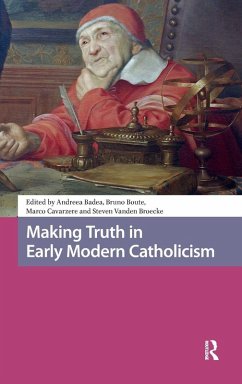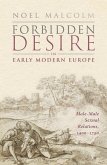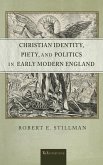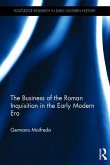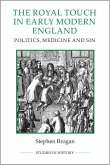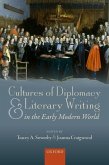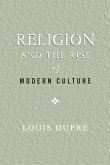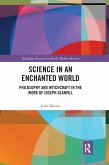Andreea Badea, Bruno Boute, Marco Cavarzere, Steven Vanden Broecke, Cecilia Cristellon
Making Truth in Early Modern Catholicism
Herausgeber: Badea, Andreea; Cavarzere, Marco; Boute, Bruno
Andreea Badea, Bruno Boute, Marco Cavarzere, Steven Vanden Broecke, Cecilia Cristellon
Making Truth in Early Modern Catholicism
Herausgeber: Badea, Andreea; Cavarzere, Marco; Boute, Bruno
- Gebundenes Buch
- Merkliste
- Auf die Merkliste
- Bewerten Bewerten
- Teilen
- Produkt teilen
- Produkterinnerung
- Produkterinnerung
This book investigates how early modern actors managed not to succumb to postmodern relativism, despite the increasing uncertainties and blatant disagreements about the nature of God, Man, and the Universe. It focuses on practices of negotiating credibility, not on conflicting notions of the content of truth.
Andere Kunden interessierten sich auch für
![Forbidden Desire in Early Modern Europe Forbidden Desire in Early Modern Europe]() Sir Noel Malcolm (Senior Research Fellow, Senior Research Fellow, AForbidden Desire in Early Modern Europe24,99 €
Sir Noel Malcolm (Senior Research Fellow, Senior Research Fellow, AForbidden Desire in Early Modern Europe24,99 €![Christian Identity, Piety, and Politics in Early Modern England Christian Identity, Piety, and Politics in Early Modern England]() Robert E. StillmanChristian Identity, Piety, and Politics in Early Modern England101,99 €
Robert E. StillmanChristian Identity, Piety, and Politics in Early Modern England101,99 €![The Business of the Roman Inquisition in the Early Modern Era The Business of the Roman Inquisition in the Early Modern Era]() Germano MaifredaThe Business of the Roman Inquisition in the Early Modern Era187,99 €
Germano MaifredaThe Business of the Roman Inquisition in the Early Modern Era187,99 €![Royal Touch in Early Modern England Royal Touch in Early Modern England]() Stephen BroganRoyal Touch in Early Modern England53,99 €
Stephen BroganRoyal Touch in Early Modern England53,99 €![Cultures of Diplomacy and Literary Writing in the Early Modern World Cultures of Diplomacy and Literary Writing in the Early Modern World]() Cultures of Diplomacy and Literary Writing in the Early Modern World111,99 €
Cultures of Diplomacy and Literary Writing in the Early Modern World111,99 €![Religion and the Rise of Modern Culture Religion and the Rise of Modern Culture]() Louis DupreReligion and the Rise of Modern Culture23,99 €
Louis DupreReligion and the Rise of Modern Culture23,99 €![Science in an Enchanted World Science in an Enchanted World]() Julie DaviesScience in an Enchanted World46,99 €
Julie DaviesScience in an Enchanted World46,99 €-
-
-
This book investigates how early modern actors managed not to succumb to postmodern relativism, despite the increasing uncertainties and blatant disagreements about the nature of God, Man, and the Universe. It focuses on practices of negotiating credibility, not on conflicting notions of the content of truth.
Produktdetails
- Produktdetails
- Scientiae Studies
- Verlag: Amsterdam University Press
- Seitenzahl: 336
- Erscheinungstermin: 5. April 2021
- Englisch
- Abmessung: 240mm x 161mm x 23mm
- Gewicht: 620g
- ISBN-13: 9789463720526
- ISBN-10: 9463720529
- Artikelnr.: 62215623
- Herstellerkennzeichnung
- Libri GmbH
- Europaallee 1
- 36244 Bad Hersfeld
- gpsr@libri.de
- Scientiae Studies
- Verlag: Amsterdam University Press
- Seitenzahl: 336
- Erscheinungstermin: 5. April 2021
- Englisch
- Abmessung: 240mm x 161mm x 23mm
- Gewicht: 620g
- ISBN-13: 9789463720526
- ISBN-10: 9463720529
- Artikelnr.: 62215623
- Herstellerkennzeichnung
- Libri GmbH
- Europaallee 1
- 36244 Bad Hersfeld
- gpsr@libri.de
Andreea Badea is a researcher at the chair for early modern history of the Goethe-University of Frankfurt am Main. Bruno Boute is a researcher at the chair for early modern history of the Goethe-University of Frankfurt am Main. Marco Cavarzere is assistant professor of early modern history at the University Ca' Foscari of Venice. Steven Vanden Broecke teaches early modern intellectual history and history of science at Ghent University.
Bruno Boute
Andreea Badea
Marco Cavarzere
and Steven Vanden Broecke: A Product's Glamour: Credibility
or the Manufacture and Administration of Truth in Early Modern Catholicism
PART I. ACCOMMODATING
1. Rudolf Schuessler: Scholastic Approaches to Reasonable Disagreement
2. Marco Cavarzere: Regulating the Credibility of Non-Christians. Oaths on False Gods and Seventeenth-Century Casuistry
3. Steven Vanden Broecke: How to be a Catholic Copernican in the Southern Netherlands
4. Brendan Röder: Appearance and Essence. Speaking the Truth about the Body in the Early Modern Catholic Church
PART II. PERFORMING
5. Bruno Boute: Saving Truth. Roman Censorship and Catholic Pluralization in the Confessionals of the Habsburg Netherlands
1682-1686
6. Birgit Emich: The Production of Truth in the Manufacture of Saints: Procedures
Credibility
and Patronage in Early Modern Processes of Canonization
7. Andreea Badea: Credibility of the Past. Writing and Censoring History within Seventeenth-Century Catholicism
8. Leen Spruit: Heresy and Error in the Assessment of Modern Philosophical Psychology
9. Maria Pia Donato: Modern Philosophy and Ancient Heresies: New Wine in Old Bottles?
PART III. EMBEDDING
10. Vittoria Fiorelli: Experiences are not a Successful Accompaniment toward the Knowledge of the Truth.' The Trial of the Atheists in Late Seventeenth-Century Naples
11. Cecilia Cristellon: Choosing Information
Selecting Truth. The Roman Congregations
the Benedictine Declaration
and the Establishment of Religious Pluralism
12. Rivka Feldhay: Disciplining the Sciences in Conflict Zones. Pre-Classical Mechanics between the Sovereign State and the Reformed Catholic Religion
Index
Andreea Badea
Marco Cavarzere
and Steven Vanden Broecke: A Product's Glamour: Credibility
or the Manufacture and Administration of Truth in Early Modern Catholicism
PART I. ACCOMMODATING
1. Rudolf Schuessler: Scholastic Approaches to Reasonable Disagreement
2. Marco Cavarzere: Regulating the Credibility of Non-Christians. Oaths on False Gods and Seventeenth-Century Casuistry
3. Steven Vanden Broecke: How to be a Catholic Copernican in the Southern Netherlands
4. Brendan Röder: Appearance and Essence. Speaking the Truth about the Body in the Early Modern Catholic Church
PART II. PERFORMING
5. Bruno Boute: Saving Truth. Roman Censorship and Catholic Pluralization in the Confessionals of the Habsburg Netherlands
1682-1686
6. Birgit Emich: The Production of Truth in the Manufacture of Saints: Procedures
Credibility
and Patronage in Early Modern Processes of Canonization
7. Andreea Badea: Credibility of the Past. Writing and Censoring History within Seventeenth-Century Catholicism
8. Leen Spruit: Heresy and Error in the Assessment of Modern Philosophical Psychology
9. Maria Pia Donato: Modern Philosophy and Ancient Heresies: New Wine in Old Bottles?
PART III. EMBEDDING
10. Vittoria Fiorelli: Experiences are not a Successful Accompaniment toward the Knowledge of the Truth.' The Trial of the Atheists in Late Seventeenth-Century Naples
11. Cecilia Cristellon: Choosing Information
Selecting Truth. The Roman Congregations
the Benedictine Declaration
and the Establishment of Religious Pluralism
12. Rivka Feldhay: Disciplining the Sciences in Conflict Zones. Pre-Classical Mechanics between the Sovereign State and the Reformed Catholic Religion
Index
Bruno Boute
Andreea Badea
Marco Cavarzere
and Steven Vanden Broecke: A Product's Glamour: Credibility
or the Manufacture and Administration of Truth in Early Modern Catholicism
PART I. ACCOMMODATING
1. Rudolf Schuessler: Scholastic Approaches to Reasonable Disagreement
2. Marco Cavarzere: Regulating the Credibility of Non-Christians. Oaths on False Gods and Seventeenth-Century Casuistry
3. Steven Vanden Broecke: How to be a Catholic Copernican in the Southern Netherlands
4. Brendan Röder: Appearance and Essence. Speaking the Truth about the Body in the Early Modern Catholic Church
PART II. PERFORMING
5. Bruno Boute: Saving Truth. Roman Censorship and Catholic Pluralization in the Confessionals of the Habsburg Netherlands
1682-1686
6. Birgit Emich: The Production of Truth in the Manufacture of Saints: Procedures
Credibility
and Patronage in Early Modern Processes of Canonization
7. Andreea Badea: Credibility of the Past. Writing and Censoring History within Seventeenth-Century Catholicism
8. Leen Spruit: Heresy and Error in the Assessment of Modern Philosophical Psychology
9. Maria Pia Donato: Modern Philosophy and Ancient Heresies: New Wine in Old Bottles?
PART III. EMBEDDING
10. Vittoria Fiorelli: Experiences are not a Successful Accompaniment toward the Knowledge of the Truth.' The Trial of the Atheists in Late Seventeenth-Century Naples
11. Cecilia Cristellon: Choosing Information
Selecting Truth. The Roman Congregations
the Benedictine Declaration
and the Establishment of Religious Pluralism
12. Rivka Feldhay: Disciplining the Sciences in Conflict Zones. Pre-Classical Mechanics between the Sovereign State and the Reformed Catholic Religion
Index
Andreea Badea
Marco Cavarzere
and Steven Vanden Broecke: A Product's Glamour: Credibility
or the Manufacture and Administration of Truth in Early Modern Catholicism
PART I. ACCOMMODATING
1. Rudolf Schuessler: Scholastic Approaches to Reasonable Disagreement
2. Marco Cavarzere: Regulating the Credibility of Non-Christians. Oaths on False Gods and Seventeenth-Century Casuistry
3. Steven Vanden Broecke: How to be a Catholic Copernican in the Southern Netherlands
4. Brendan Röder: Appearance and Essence. Speaking the Truth about the Body in the Early Modern Catholic Church
PART II. PERFORMING
5. Bruno Boute: Saving Truth. Roman Censorship and Catholic Pluralization in the Confessionals of the Habsburg Netherlands
1682-1686
6. Birgit Emich: The Production of Truth in the Manufacture of Saints: Procedures
Credibility
and Patronage in Early Modern Processes of Canonization
7. Andreea Badea: Credibility of the Past. Writing and Censoring History within Seventeenth-Century Catholicism
8. Leen Spruit: Heresy and Error in the Assessment of Modern Philosophical Psychology
9. Maria Pia Donato: Modern Philosophy and Ancient Heresies: New Wine in Old Bottles?
PART III. EMBEDDING
10. Vittoria Fiorelli: Experiences are not a Successful Accompaniment toward the Knowledge of the Truth.' The Trial of the Atheists in Late Seventeenth-Century Naples
11. Cecilia Cristellon: Choosing Information
Selecting Truth. The Roman Congregations
the Benedictine Declaration
and the Establishment of Religious Pluralism
12. Rivka Feldhay: Disciplining the Sciences in Conflict Zones. Pre-Classical Mechanics between the Sovereign State and the Reformed Catholic Religion
Index

